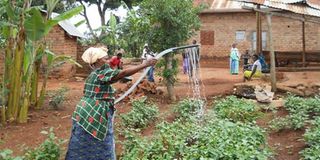Uganda to promote the year of family farming in 2014

In many countries like Uganda, small scale farming can drive development. FILE Photo
What you need to know:
Smallholder farming, which is largely centred on family labour, accounts for most of the food production. As UN declares 2014 the year to focus on farming, Gumisiriza Mwesigye compiled an account of both global and national perspectives.
This year, 2014, is internationally recognised as the International Year of Family Farming to bring into focus its importance and significant role in food security, livelihoods and national development.
Mostly practised by smallholder farmers, it is broadly includes any agricultural production involving crops, fisheries, forestry, and livestock, among others, which is operated and managed by a family and largely relies on family labour.
In both developing and developed countries, it is the predominant form of agriculture in the food production sector.
Family and small-scale farming are inextricably linked to world food security. It preserves traditional food products, while contributing to a balanced diet and safeguarding the world’s agro-biodiversity and the sustainable use of natural resources. It also represents an opportunity to boost local economies, especially when combined with specific policies aimed at social protection and well-being of communities.
Ways of life
Therefore, the International Year of Family Farming raises the profile of family farming and smallholder farming by focusing world attention on it. The goal is to reposition it at the centre of national agendas by identifying gaps and opportunities to promote a shift towards a more equal and balanced development.
Worldwide, it is estimated that 500 million people are family farmers working with billions of crops on land measuring less than five acres each. In Africa, family farming provides 80 per cent of food consumed on the continent. In addition to this, it is part of a socio-economic structure and also preserves values and ways of life.
It can also contribute to improving livelihoods, managing natural resources, protecting the environment, and achieving sustainable development.
However, this model, with the right support in services and infrastructure, among others, could come on the basis of sustainable rural development in favour of millions of people.
Thus, the International Year of Family Farming will promote broad discussion and cooperation at the national, regional and global levels to increase awareness and understanding of the challenges faced by smallholders and help identify efficient ways to support family farmers.
In Uganda, agriculture is dominated by smallholder farmers who account for 70 per cent while commercialised farming constitutes the remaining 30 per cent.
And as pointed out by the minister of agriculture, Tress Bucyanayandi, at the national launch in November 2013, it is pertinent that their efforts are emphasised given the structure of the economy.
This will be through the adapted commodity approach where all departments, agencies and research institutes concentrate on different farming activities carried out by the small-scale farmers, who are also the family farmers.
He added that the ministry developed a Development Strategy Investment Plan to guide the transformation of this kind of farming for increased incomes of the rural population as well as improved food and nutrition security.
Bucyanayandi also acknowledged the impact of climate change, price fluctuations on the market, and rural-urban migration of the youth that has affected agricultural production and productivity.
Addressing the challenges in the sector would have a specific focus to cater for the youth and women and support the dominant producers through appropriate technology and inputs like fertilisers, seeds, irrigation and value addition to enable increased production and productivity.
Collaboration
At national level, there are several factors that are key for a successful development of family farming such as: agro-ecological conditions and territorial characteristics; policy environment; access to markets; access to land and natural resources; access to technology and extension services; access to finance; demographic, economic and socio-cultural conditions; education, among others.
The International Year of Family Farming will focus on three global lines of action that will be implemented in collaboration with relevant partners.
These include promotion of dialogue in policy decision making processes, identification, documentation and sharing of lessons learnt and successful experiences of existing pro-family policies at the national levels and communication, advocacy and outreach.
The Food and Agriculture Organisation will facilitate its implementation, in collaboration with governments, international development agencies, farmers’ associations and non-governmental organisations.




